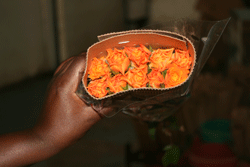
What it takes charm flowers to produce high quality roses
The flower market demands high quality roses and responsible way of growing. This has made growers to come up with innovative measures of quality flower production, protection of the environment as well as their employees.
These innovations have spearheaded the industry in Kenya to become one of the most vibrant sector contributing immensely to the country’s GDP through export’s and employment thus supporting over 2 million households both directly and indirectly across the whole flower value chain.
As the world rejoice on the quality of roses from the country, growers on the other hand grapple with several challenges that they struggle to overcome on a day to day basis.
Charm Flowers Limited incorporated in June 2000, is one of the most reputable grower and supplier of roses in Kenya and is located at Kisaju, Kajiado County. The farm has devised various ways of countering various challenges as they maintain the superiority of their flowers in the market.
The company which was well renowned for Lisianthus, prides itself in cultivation of various varieties of standard roses such as Athena, Eliza, Glacier+, Good Times, Magic Avalanche+, Red Naomi, Nightingale, Mariyo, Mayfair, Red Ribbon, Marie Claire, Sorbert Avalanche+.
They provide a one stop shop for supply of freshly cut roses and herbs to the export market, mainly UK, Germany, Scandinavian countries and the rest of Europe; for both direct and auction markets. Athena is their best variety, producing on average 200 stems per square metre.
Proliferation of pests and diseases is one of the threat the growers encounter on a daily basis. Charm Flowers have adopted both preventive and curative methods of keeping them at bay.
To curb thrips which nowadays are numerous in farms, they usually spray 2 times per week. “During hot season, like the one we are currently experiencing, flowers are susceptible to mites and mealybugs. To control mites we use organosilicones and do weekly sprays. Downey mildew which usually attack flowers during the rainy season or when humidity is high, and is very dangerous when it befall plants we usually spray preventatives; otherwise if it attack plants it is hard to recover. But the good thing with the disease is that depending with rose variety, some varieties are able to withstand it, as they hardens say from the second year from planting,” Elizabeth Nderi the Farm Production Manager in charge of rose production explained.
The location of the farm is prone to frequent strong winds which blow up the rooftops of their greenhouses; hence the company have stationed men for full time repair works.
To counter the adverse effects of wind, they have planted many trees to act as wind breakers. The trees in turn have created a good canopy for shade hence a good relaxation place; as if it is out of the dry hot Masaai land.
All the flowers in this farm are grown on soil. The black cotton soil is a boost to them due to its high water retention rate hence ensuring the flowers have good water uptake.
During the hot weather, the company usually install automated spray to mist water humidifying roses. This is because roses experience stress in harsh weather conditions. According to Elizabeth, high temperatures affect the production of the flowers in that the head size and stem length reduces even if the number of stems per square meter increases.

